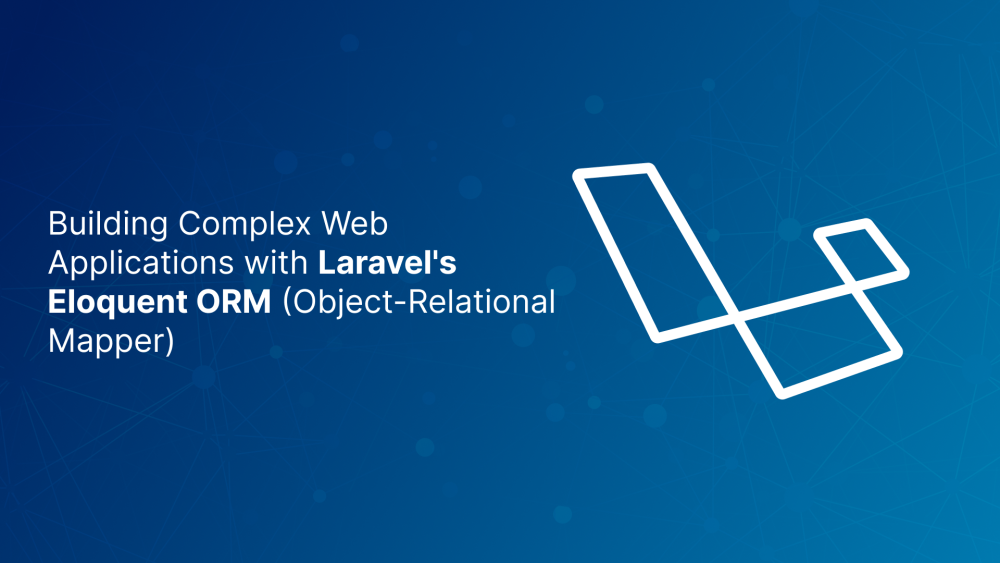Laravel, a robust PHP framework, offers a powerful tool for interacting with databases: Eloquent ORM. Eloquent simplifies database operations by abstracting complex SQL queries into intuitive PHP objects. This blog delves into the intricacies of Eloquent ORM, exploring its capabilities, best practices, and real-world applications in building complex web applications.
Understanding Eloquent ORM
Eloquent ORM is an object-relational mapper (ORM) included by default in Laravel. It provides an elegant interface for interacting with databases by mapping database tables to PHP classes. This abstraction significantly improves developer productivity and code maintainability.
Key features of Eloquent:
-
Model Definition: Create PHP classes representing database tables.
-
CRUD Operations: Perform create, read, update, and delete operations on database records.
-
Relationships: Define relationships between models (one-to-one, one-to-many, many-to-many).
-
Query Builder: Construct complex database queries using a fluent interface.
-
Raw Queries: Execute custom SQL queries when necessary.
By leveraging Eloquent's features, developers can focus on application logic rather than writing complex SQL statements.
Building Complex Relationships with Eloquent
Eloquent excels in handling complex database relationships:
-
One-to-One Relationships: Model relationships where one record in a table corresponds to exactly one record in another table.
-
One-to-Many Relationships: Model relationships where one record in a table can have multiple records in another table.
-
Many-to-Many Relationships: Model relationships where multiple records in one table can be associated with multiple records in another table.
-
Polymorphic Relationships: Model relationships where a model can belong to multiple other models.
These relationships allow developers to easily retrieve related data and build sophisticated application logic.
Optimizing Database Queries with Eloquent
To ensure optimal performance, consider the following techniques:
-
Query Scopes: Define reusable query scopes for common query patterns.
-
Lazy Loading vs. Eager Loading: Choose the appropriate loading strategy based on query requirements.
-
Caching: Implement query caching to improve performance for frequently executed queries.
-
Indexes: Create appropriate database indexes to speed up query execution.
-
Raw Queries: Use raw queries for complex or performance-critical operations when necessary.
By optimizing database queries, developers can significantly enhance application responsiveness and scalability.
Real-World Use Cases of Eloquent ORM
Eloquent ORM finds applications in various domains:
-
E-commerce: Managing product catalogs, customer data, orders, and inventory.
-
Content Management Systems (CMS):: Handling content creation, editing, and publishing.
-
Social Networking: Managing user profiles, relationships, posts, and comments.
-
Enterprise Applications: Building complex business applications with extensive data models.
Eloquent's flexibility and power make it suitable for a wide range of web applications.
Integrating Eloquent with Other Tools and Technologies
Eloquent can be integrated with other tools and technologies to enhance application functionality:
-
Database Drivers: Eloquent supports various database drivers (MySQL, PostgreSQL, SQLite, SQL Server) to accommodate different project requirements.
-
ORM Tools: Consider using additional ORM tools or libraries for specific advanced features or performance optimizations.
-
Caching Systems: Integrate with caching solutions (e.g., Redis, Memcached) to improve query performance.
-
Testing Frameworks: Utilize testing frameworks like PHPUnit to write unit and integration tests for Eloquent models.
By combining Eloquent with these tools, developers can create robust and scalable web applications.
Challenges and Considerations
While Eloquent simplifies database interactions, it's essential to be aware of potential challenges:
-
Performance Bottlenecks: Complex queries or large datasets might impact performance.
-
N+1 Problem: Eager loading can lead to performance issues if not used carefully.
-
Data Modeling Complexity: Designing efficient database schemas requires careful consideration.
-
Security: Protect sensitive data by implementing proper security measures.
Addressing these challenges requires a deep understanding of Eloquent's capabilities and best practices.
Conclusion
Laravel's Eloquent ORM is a powerful tool for building complex web applications. By mastering its features and following best practices, developers can create efficient, scalable, and maintainable applications. As the web development landscape evolves, Eloquent continues to be a cornerstone for modern PHP development.
Remember, effective use of Eloquent requires a balance between simplicity and performance optimization. By carefully considering your application's requirements and leveraging Eloquent's capabilities, you can build robust and scalable web applications that meet the demands of today's digital world.



.png)